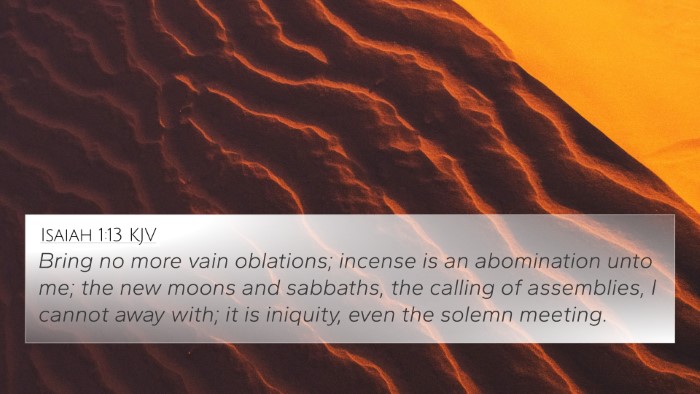Understanding 1 Corinthians 11:17
In this verse, the Apostle Paul addresses the Corinthian church regarding their conduct during communal gatherings, specifically involving the observance of the Lord's Supper. Paul's concern is centered around the divisions and conflicts that arise in their meetings, which are meant for unity and fellowship among believers.
Verse Context
1 Corinthians 11:17 (KJV) states:
"Now in this that I declare unto you I praise you not, that ye come together not for the better, but for the worse."
This passage serves as a critique of the Corinthian community. The Apostle Paul, known for his role in establishing the early church, emphasizes the importance of proper conduct and mutual respect during worship practices.
Commentary Insights
From the insights of renowned biblical commentators:
- Matthew Henry:
Henry highlights the gravity of coming together for worship in a manner that does not honor God. He underscores that their gatherings were producing more harm than good, primarily due to the spirit of division and lack of genuine love among the attendees.
- Albert Barnes:
Barnes elaborates on the implications of their actions, noting that Paul is not just identifying a problem, but also setting the foundation for correction. He stresses the need for reverence and unity, which should characterize Christian fellowship.
- Adam Clarke:
Clarke points out the contradiction highlighted by Paul: gatherings intended for collective edification were steeped in discord. He emphasizes that such behavior undermines the very essence of Christian community, which ought to exemplify love and togetherness.
Related Bible Cross-References
This verse presents several crucial themes that resonate throughout Scripture, offering an opportunity for deeper understanding through cross-referencing:
- Matthew 18:20: "For where two or three are gathered together in my name, there am I in the midst of them." - Highlights the importance of unity in gatherings.
- John 13:34-35: "A new commandment I give unto you, That ye love one another; as I have loved you..." - Emphasizes love as the foundation of Christian fellowship.
- James 1:19: "Wherefore, my beloved brethren, let every man be swift to hear, slow to speak, slow to wrath:" - Reminds believers of the importance of listening and harmony in communication.
- 1 Corinthians 1:10: "Now I beseech you, brethren, by the name of our Lord Jesus Christ, that ye all speak the same thing..." - Calls for unity and commonality in the Church.
- 1 John 4:20: "If a man say, I love God, and hateth his brother, he is a liar..." - Directly connects love for God with love for others in the community.
- Romans 12:10: "Be kindly affectioned one to another with brotherly love; in honour preferring one another." - Illustrates the spirit of fellowship that should prevail among believers.
- Galatians 6:2: "Bear ye one another's burdens, and so fulfill the law of Christ." - Encourages mutual support and responsibility in the community.
Thematic Connections
This verse opens a dialogue not only with the immediate context of the Corinthian church but also with broader themes found throughout the New Testament:
- Divine Order vs. Human Disorder: Through this verse, Paul addresses the divine order expected in worship, contrasting it with the human disorder evident in the Corinthian practices.
- The Role of Self-Examination: As subsequent verses urge believers to evaluate their actions during communion, there is an inter-Biblical emphasis on self-examination before God to maintain holiness and purity in worship settings.
- Unity in Diversity: This passage emphasizes the need for unity within the church even as individual differences exist. Believers are encouraged to operate as one body while acknowledging the diversity of gifts and characteristics.
Practical Applications
The lessons derived from 1 Corinthians 11:17 are applicable in contemporary contexts:
- Promote Unity: Christians today are called to foster unity in their congregations, avoiding divisive behaviors that may lead to disunity and strife.
- Engagement in Communion: Preparing for the Lord's Supper should be a time of reflection and reconciliation among congregants, modeling Christ's love and forgiveness.
- Addressing Conflicts: Churches must be proactive in addressing conflicts and misunderstandings, prioritizing peace and harmony in their gatherings.
Conclusion
1 Corinthians 11:17 serves as a critical reminder of the importance of unity, love, and respectful conduct within the church. By examining related scriptures and themes, believers can deepen their understanding of these concepts and apply them within their own congregational practices.
Explore Further
For a comprehensive exploration of scripture, one might consider various tools for Bible cross-referencing, including:
- Bible Concordance: A resource for finding specific verses and themes.
- Cross-Reference Guide: A method for identifying related scriptures.
- Comparative Study of Pauline Epistles: Understanding the Apostle Paul's teachings throughout his letters.
















